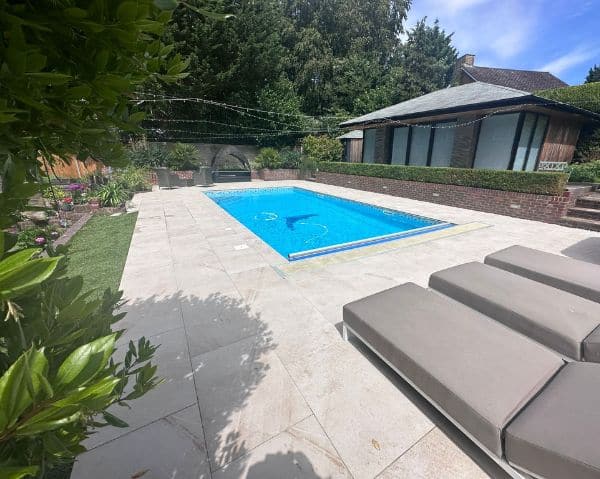Water Conservation Strategies for Scorching Summers
The hot summer months are now upon us and with the rising temperatures this season brings, maintaining a lush and vibrant landscape can be challenging.
While this is the perfect opportunity to spend time outdoors and enjoy your previous landscaping work, your garden still needs support. Summer can be a beautiful season of growth, vibrant colours and outdoor entertainment but this does not have to come at the cost of the environment.
Maintaining a healthy, vibrant garden well into the season does require additional landscaping work – but this does not have to mean overusing natural resources, like water.
At S&D Paving & Landscaping, we understand the importance of water conservation, especially during August and can help you maintain a beautiful outdoor space while also conserving water as much as possible.
In this guide, we are sharing some expert tips to help you save water while also supporting your thriving garden during the hottest months of the year.
Why Does Water Conservation Matter?
As a homeowner and budding garden enthusiast, you may be wondering why water conservation matters.
It is easy to get caught up in our own landscapes and forget about everything else outside our fences, but water conservation impacts everyone and therefore needs to be considered as much as possible. Especially when tending to your garden during summer, when water usage is often at its highest.
Water is a precious resource, and conserving it is essential for environmental sustainability and cost savings. Not only does water usage impact the wider environment, but it can also contribute to your household bills – which is something we always want to reduce.
During the summer, the demand for water increases significantly as the temperatures rise and our landscapes become dry. With more water use, higher bills and potential water shortages are common risks and you can be a part of this without careful consideration.
By implementing water-wise landscaping practices, you can reduce your water usage, lower your utility costs, and contribute to a more sustainable environment while also maintaining the thriving garden you are so proud of simply by reconsidering the methods you use.
Our water conservation strategies are a great way for you to reduce the impact on the environment and your wallet, while still keeping up appearances within your own landscape.
What Are The Best Water Conservation Strategies For My Garden?
Before making any changes to your landscaping schedule or trying to implement water conservation strategies into your gardening plan, it’s crucial to understand your garden’s specific water needs.
Different plants have varying water requirements and the kind of landscape you have can influence what kind of care is needed as the season progresses. Some of the water conservation strategies we offer may not be suitable for your particular landscape and should be avoided to ensure maximum health and beauty.
Before making any changes to your landscape and implementing these water conservation strategies, conduct a thorough assessment of the garden. This can also be done by professional landscapers and is required to identify which areas of your garden need the most water and which can thrive with less – helping you develop a better plan for water conservation and environmental care.
Top Water Conversation Strategies For All Landscapes
Now that you understand the needs of your garden and the kind of care the environment requires, you can begin to implement water conservation strategies into your gardening calendar.
These strategies can be used conjunctively or individually to reduce your water usage, protect the environment and help maintain a healthy garden even during the hottest months of the year.
Choose Drought-Resistant Plants
One of the most effective ways to conserve water is to select drought-resistant plants. These plants are naturally adapted to survive with minimal water and therefore do not require constant hydration, even as the summer progresses and temperatures rise.
Some excellent choices for a water-wise garden include:
- Lavender – Known for its beautiful purple flowers and fragrant scent, lavender is not only drought-tolerant but also attracts pollinators making it a great addition to any thriving garden.
- Sage – With its aromatic leaves and vibrant blooms, sage is an excellent addition to any landscape and does not require constant hydration.
- Succulents – These hardy plants store water in their leaves, making them perfect for hot, dry conditions.
- Native Grasses – Native grasses are well-suited to local climates and require less water than traditional lawns. These can vary based on your specific location but can be a great addition to all forms of outdoor spaces across the region.
By incorporating these plants into your garden design, you can create a beautiful and sustainable landscape that requires less water all year round, but especially during the hot summer months when water usage is at a premium.
Implement Efficient Water Irrigation Systems
Efficient irrigation is key to water conservation and can be a great tool for all kinds of landscapes to reduce water usage without impacting the growth of plants.
Traditional sprinklers can waste a significant amount of water through evaporation and runoff and are therefore not always the best solution for your garden during the summer. Instead of relying on these traditional systems, consider upgrading to a more efficient irrigation system, such as:
- Drip Irrigation – This method delivers water directly to the roots of plants, reducing evaporation and ensuring that water is used efficiently.
- Soaker Hoses – Similar to drip irrigation, soaker hoses release water slowly and evenly along their length, providing deep watering for plants.
- Smart Irrigation Controllers – These devices adjust watering schedules based on weather conditions, soil moisture levels, and plant needs, ensuring optimal water usage.
Properly maintaining your irrigation system is also crucial in supporting the needs of your landscape without excessive water usage, which is why it is one of the best water conservation strategies.
To maintain water irrigation systems, you need to regularly check the systems during the summer. Take time to look for leaks, clogs, and broken components within the system to ensure that water is being delivered efficiently and get repairs done as quickly as possible.
Mulch Your Garden Beds
Mulching is a simple yet effective way to conserve water in your garden, and can also be one of the cheapest solutions to implement.
A layer of mulch helps retain soil moisture, reduce evaporation, and suppress weeds making it a great all-round tool for healthy landscapes. Organic mulches, such as wood chips, bark, and compost, also improve soil health as they decompose, providing benefits without additional care.
As a water conservation strategy, apply a 2-4 inch layer of mulch around your plants, ensuring that it doesn’t touch the stems or trunks and allow moisture to be restrained as the season goes on.
Water Early in the Morning or Late in the Evening
Timing is everything when it comes to watering your garden during the summer and making a better watering schedule is one of the most effective water conservation strategies.
During the summer, it is a good idea to water your plants, lawn and overall landscape during the cooler parts of the day, such as early morning or late evening. Watering during these cooler times helps to reduce evaporation and allows plants to absorb water more effectively so you do not need to water them as much.
It is a good idea to avoid watering during the hottest part of the day during the summer, such as midday or afternoon hours, as much of the water will evaporate before it reaches the roots meaning you are essentially wasting water.
Group Plants with Similar Water Needs
Grouping plants with similar water needs is a practical way to ensure efficient watering and is one of the simplest water conservation strategies.
This tip does not require any additional changes or tools, but rather some standard reorganisation of your landscape for better watering schedules. By placing plants with high water requirements together and those with low needs in another area, you can tailor your irrigation efforts to meet their specific needs and limit your water usage across the landscape.
This practice, known as hydrozoning, helps prevent overwatering and underwatering, promoting healthier plant growth without additional water usage.
Reduce Lawn Areas
Traditional lawns require a significant amount of water to stay green and healthy, especially during the hot, dry summer months.
As part of ongoing water conservation strategies, consider reducing the size of your lawn and replacing it with drought-resistant ground covers, native grasses, or hardscaping elements like gravel, stones, and pavers. This will not only reduce your water usage this summer but for future seasons too.
For any remaining lawn areas, it is recommended that you choose drought-tolerant grass species as these require less frequent watering.
No matter what kind of lawn you have in your garden, it is a good idea to mow at a higher height during the summer as this will promote deeper root growth and reduce water evaporation.
Collect and Reuse Rainwater
Harvesting rainwater is an excellent way to conserve water and provide your garden with a natural source of hydration all summer long.
Although summer is a bright and hot season, the UK is renowned for its ongoing rainfall which will continue no matter the season. Although some people may complain about this, the likelihood of rain during the summer is good news for sustainable gardeners as it plays a big part in these water conservation strategies.
Install rain barrels or other collection systems to capture rainwater from your roof, and then use this water for irrigating your garden, washing tools, or other outdoor tasks. Rainwater is free of chemicals commonly found in tap water, making it more beneficial for your plants as well as helping reduce your energy bills and impact on the environment.
Regular Maintenance and Soil Improvement
Maintaining your garden and improving soil quality are essential for water conservation. Healthy soil retains moisture better and supports strong plant growth which is why it is one of the key water conservation strategies.
During the summer, take the time to regularly aerate your soil to improve water infiltration and reduce runoff. You can also incorporate organic matter, such as compost, into your soil to enhance its structure and water-holding capacity without additional costs.
Additionally, promptly address any pest or disease issues to prevent stress on your plants, which can increase their water needs by using natural pest repellants all season long.
Educate and Involve Your Family
Water conservation is a collective effort, and involving your family can make a significant impact.
During the summer, educate your family members about the importance of saving water and encourage them to participate in water-wise gardening practices with you.
Simple actions, such as turning off the hose while washing the car or collecting kitchen rinse water for plants, can add up to substantial water savings and can be done by everyone all season long.
Conclusion
By implementing these water conservation strategies, you can create a beautiful, sustainable garden that thrives even during the hot summer months. Whether you’re a seasoned gardener or just starting, these water conservation strategies will help you achieve a water-wise landscape that enhances the beauty of your home and contributes to a more sustainable future.
At S&D Paving & Landscaping, we are passionate about helping you achieve a lush, vibrant landscape while conserving water and protecting the environment and offer a range of services to bring your vision to life.
Contact Us Today
Are you ready to transform your garden into a water-efficient haven? Contact us today to learn more about our landscaping and garden design services.
Together, we can create a landscape that reflects your style and values while making a positive impact on the planet. Remember, every drop counts – let’s make the most of it!





